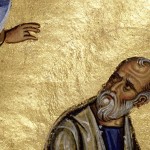by Humbert of Romans
CHAPTER ONE
IV. The Benefits Which It Brings to the Preacher; the Office of Preaching: Part One
 Let us now see what the office of preaching does for the preacher himself.
Let us now see what the office of preaching does for the preacher himself.
Note, first of all, that he ought to be supplied with the necessities of this life, as St. Paul has stated, giving many reasons and ending by saying:
“So also the Lord directed that those who preach the Gospel should have their living from the gospel” (1 Cor. 9:14).
Also they should be held in reverence by the people. In other professions man is solicitous for those things necessary for his life; but of preachers it is said:
“Therefore do not be anxious saying ‘What shall we eat?’ or “What shall we drink?’ or ‘What shall we put on?’; for your Father knows that you need all these things” (Matt. 6:31-32).
And while a universal law is imposed on all men
“that they eat their bread by the sweat of their brow” (Gen. 3:19),
the Lord says that preachers more so than to the rest of men,
“Look at the birds of the air: they do not sow ore reap, or gather into barns. . . . See how the lilies of the field grow; they neither toil nor spin, yet, I say to you that not even Solomon in all his glory was arrayed like one of these” (Matt. 6:26, 28-29).
As if to say, “Since God gives the birds their food, and the lilies their white array and yet they do not work, do not doubt that He will do as much and more for you, who, in His eyes are worth much more.”
It often happens to men overwhelmed with cares and burdened with labor that for the sake of worldly necessities they suffer many vicissitudes. From these words of St. Luke,
“Carry neither purse, nor wallet” (Luke 10:4),
St. Gregory explains that preachers are justified in putting such a trust in God alone, that, without thinking about providing for themselves, they are assured that nothing will be wanting to them; otherwise, their minds, too preoccupied with temporal things, would be less free to attend to the things of eternal life. Since this truth, that God is charged with providing preachers with temporal necessities (without working for them or being preoccupied about getting them), will not perhaps be readily admitted, our Lord wishing to establish it on the testimony of deeds, before leaving earth, asked His Apostles this question publicly:
“Without purse, or wallet, or sandals, did you lack anything?” And they answered, “Nothing” (Luke 22:35-36).
This confirms most conclusively the truth under question.
The merit of preachers assures them of innumerable spiritual graces:
“He that inebriateth shall be inebriated also himself” (Prov. 11:25),
the Book of Proverbs tells us, and the gloss explains it:
“Whoever intoxicates his hearers with the wine of divine words, will drink fully of the wine of divine grace.”
We read, in the same chapter of Proverbs:
“The soul which blesseth shall be made fat” (Prov. 11:25),
that is, he who spreads divine grace without, receives within himself an increase of strength. If during the course of his earthly life, he should become stained, he will be cleansed.
“Sometimes I purify my feet in milk” (Job 39:6),
said holy Job; which signifies, says the gloss, that the feet of preachers are not always free from stains, but are purified in milk; or, in other words, that the dust which they have gathered in the midst of the world will be taken away by the good works which fill them with merit.
God also gives these preachers understanding, for, according to the gloss, they resemble the bird of whom it is written in the book of Job:
“Who gave the cock understanding?” (Job 38:36).
Who, if not God, has given it a kind of understanding? For if a cock by reason of its instinct is able to announce the hour of dawn, it is still more fitting that a preacher receive the understanding necessary to announce the hour of salvation.
It is the same with regard to the gift of eloquence. When Moses refused the mission which God wanted to entrust to him, because he was very slow of speech, the Lord answered him:
“Who made man’s mouth? Did not I? Go, therefore, and I will open thy mouth” (Exod. 4:11-12);
whence if clearly follows that it is God’s duty to open the mouth of the preacher. Not only does He open his mouth, but He makes the words flow freely:
“Open thy mouth wide and I will fill it” (Ps. 80:11).
And the significance of this is: I will put there such an abundance of words that you will only have to let them flow out. We have an example of this in St. Sebastian who was in the service of Nicostrate, the husband of Zoe. Sebastian saw a young man descend from heaven and present him with a book from which he had only to read his discourse.
In addition, God gives these words and efficacious power; David said,
“The Lord will give to his voice the voice of power” (Ps 67:34),
and since the preacher is the mouth of God, He will not fail to give power to those words which are preached in His name.
The Holy Spirit, the author of all good, distributes to each preacher many other graces, generously to some, less generously to others. That is the reason why it is written:
“The Lord will give the word to them that preach good tidings with great power” (Ps. 68:12).
Preachers are likened to “the heavens” because, just as the heavens are adorned with many stars, so are they enriched with many virtues. Job, using the same comparison, says,
“His spirit hath adorned the heavens” (Job 26:13);
for these ornaments, according to St. Gregory, are the gifts which He gives to the ministers of the Gospel and which St. Paul enumerates in these terms:
“To one through the Spirit is given the utterance of wisdom, to another, the utterance of knowledge, according to the same Spirit; to another faith, in the same Spirit; to another, the gift of healing in the one Spirit; to another the working of miracles; to another prophecy; to another the distinguishing of spirits; to another various kinds of tongues; to another, interpretation of tongues” (I Cor. 12:8-10).
But it is fitting that these graces be dispensed more abundantly to those preachers who labor especially for the welfare of the Church; for God distributes His graces to each one, not only for his own personal needs, but also for the advantage of others. Thus it is that the Apostle says:
“Now the manifestation of the Spirit is given to everyone for profit” (I Cor. 7:7).
Upon which the gloss justly remarks that if the gifts of grace are granted to increase the personal merit of certain individuals, then they are also given with a view of the common good of the Church. This being the case, with how much greater abundance will not these spiritual gifts be bestowed by God upon holy preaching? Sometimes, as a matter of fact, the pious exposition of the truths of God rouses the fervor of the people and actually causes them to burst forth into words of praise and blessing, much in the manner spoken of in Proverbs:
“He that hideth up corn (i.e., according to the gloss apostolic preaching), shall be cursed among the people; but a blessing upon the head of them that sell” (Prov. 11:26).
We find a vivid example of what we mean in the woman in the Gospel account who, hearing the words of Christ cried out:
“Blessed is the woman that bore Thee, and the breasts that nursed Thee” (Luke 11:27).
![]()
This is an excerpt from the Preachers Institute publication:
On the Formation of Preachers
You can purchase the Ebook HERE, the Kindle version HERE
and the Paperback by clicking the image above.

